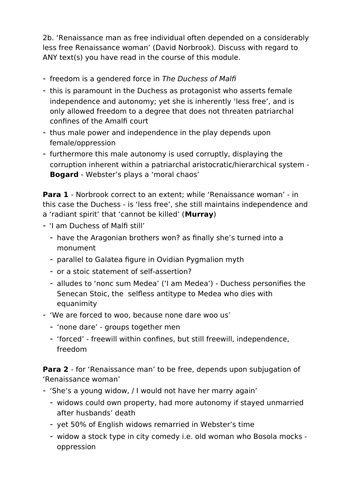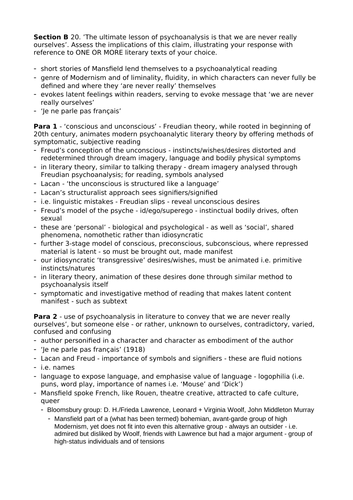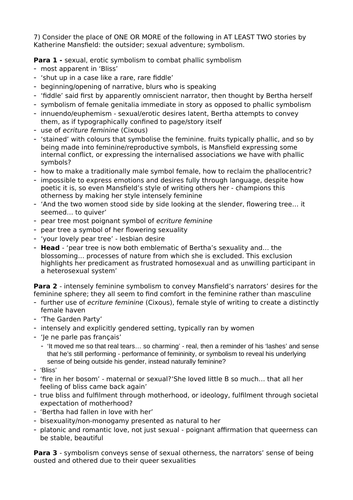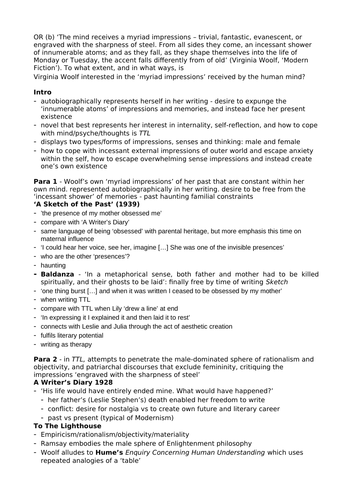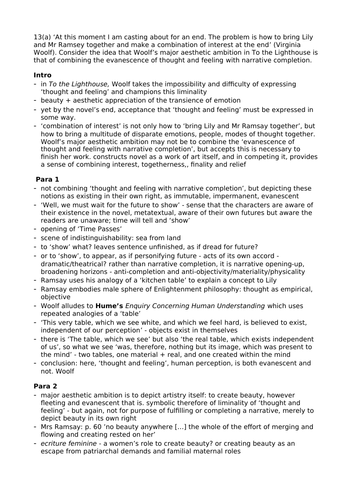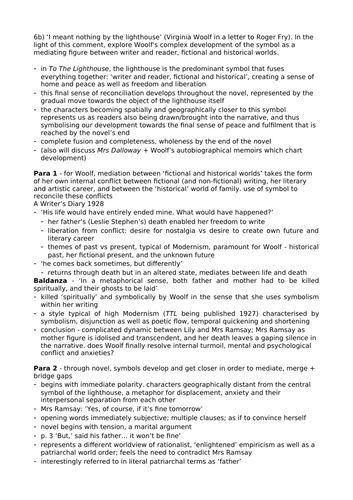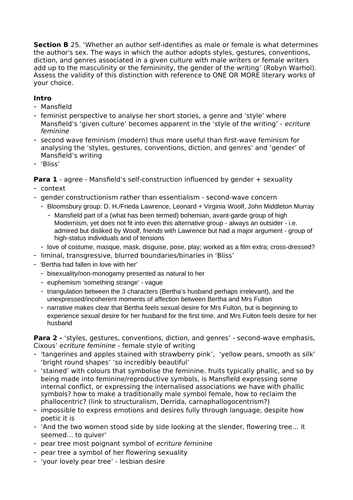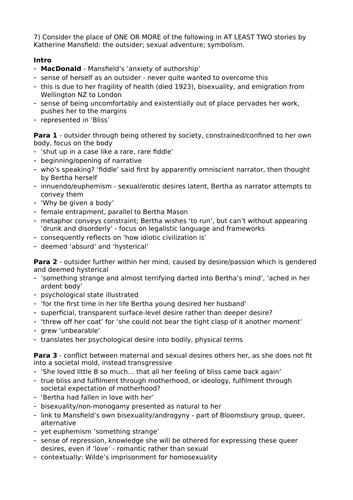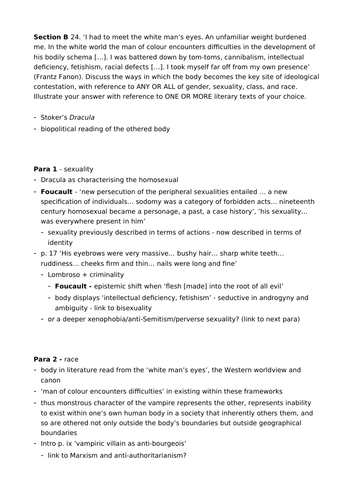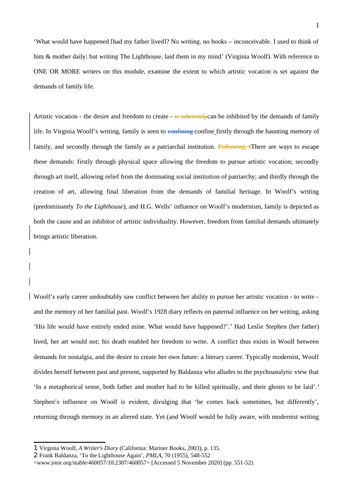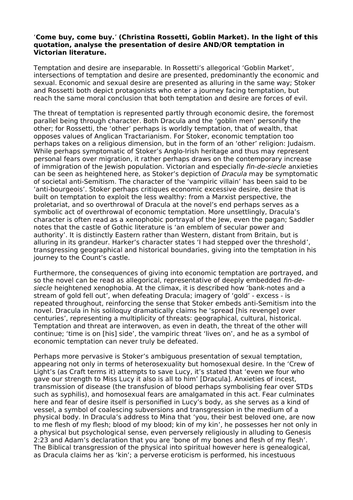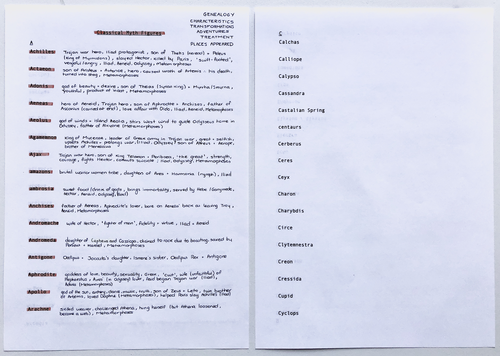
89Uploads
21k+Views
1k+Downloads
English language arts

Essay Plan: The Duchess of Malfi & Freedom
An essay plan on John Webster’s The Duchess of Malfi on the theme of freedom.
It answers the question:
‘Renaissance man as free individual often depended on a considerably less free Renaissance woman’ (David Norbrook). Discuss with regard to ANY text(s) you have read in the course of this module.
The plan discusses freedom in regards to women during the Jacobean era, as well as male autonomy, corruption, patriarchy, power and independence vs oppression, etc. Engages in a dialogue with the critical quotation in the question.
Excellent resource for university and A-level students. Written by a Durham University second-year student.

A* A-level English Streetcar/Malfi Comparison
A* / near full mark essay for English literature comparing ‘A Streetcar Named Desire’ (Williams) and ‘The Duchess of Malfi’ (Webster).
On men and women/gender power struggles which is a central theme needed for any essay for Eduqas/WJEC!
Can also be used for AQA/OCR/Edexcel/CCEA/CIE.

Essay Plan: Katherine Mansfield and Psychoanalysis
This essay plan was written by a second-year undergraduate at Durham University.
It looks at the question: ’The ultimate lesson of psychoanalysis is that we are never really ourselves’. Assess the implications of this claim, illustrating your response with reference to ONE OR MORE literary texts of your choice.
This analyses Katherine Mansfield’s short story, 'Je ne parle pas français’, using Lacanian and Freudian 20th-century models of psychoanalysis, during the Modernist era.
Can be used for university as well as A-level students.

Essay Plan: Katherine Mansfield and Symbolism
This essay plan was written by a second-year undergraduate at Durham University.
It looks at the question: Consider the place of ONE OR MORE of the following in AT LEAST TWO stories by Katherine Mansfield: the outsider; sexual adventure; symbolism.
This analyses symbolism within Katherine Mansfield’s short stories, ‘Bliss’, ‘Je ne parle pas francais’, and ‘The Garden Party’. Feminine, sexual, and erotic symbolism, and Helene Cixous’ theory of ecriture feminine is looked at.
Can be used for university as well as A-level students.

Essay Plan: Impressions in Virginia Woolf's writing
This resource is a plan written by a second-year undergraduate at Durham University.
It looks at the question: ‘The mind receives a myriad impressions – trivial, fantastic, evanescent, or engraved with the sharpness of steel. From all sides they come, an incessant shower of innumerable atoms; and as they fall, as they shape themselves into the life of Monday or Tuesday, the accent falls differently from of old’ (Virginia Woolf, ‘Modern Fiction’). To what extent, and in what ways, is Virginia Woolf interested in the ‘myriad impressions’ received by the human mind?
This can be used as a starting point to research themes of objectivity, family life, femininity, and symbolism within Virginia Woolf’s various works.

Essay Plan: Feeling in Virginia Woolf's writing
This resource is a plan written by a second-year undergraduate at Durham University.
It looks at the question: ‘At this moment I am casting about for an end. The problem is how to bring Lily and Mr Ramsey together and make a combination of interest at the end’ (Virginia Woolf). Consider the idea that Woolf’s major aesthetic ambition in To the Lighthouse is that of combining the evanescence of thought and feeling with narrative completion.
This can be used as a starting point to research themes of artistry, objectivity, imagery and symbolism within Virginia Woolf’s various works.

Essay Plan: Virginia Woolf and Symbolism
This essay plan was created by a second-year English Literature undergraduate at Durham University.
It looks at the question: ‘I meant nothing by the lighthouse’ (Virginia Woolf in a letter to Roger Fry). In the light of this comment, explore Woolf’s complex development of the symbol as a mediating figure between writer and reader, fictional and historical worlds.
This analyses Woolf’s works, A Sketch of the Past, Mrs Dalloway, To the Lighthouse, and ‘A Writer’s Diary’.

Essay Plan: Gender in Katherine Mansfield's 'Bliss'
This essay plan was created by a second-year English Literature undergraduate at Durham University.
It looks at the question: ‘Whether an author self-identifies as male or female is what determines the author’s sex. The ways in which the author adopts styles, gestures, conventions, diction, and genres associated in a given culture with male writers or female writers add up to the masculinity or the femininity, the gender of the writing’ (Robyn Warhol). Assess the validity of this distinction with reference to ONE OR MORE literary works of your choice.
This analyses Mansfield’s place within the Bloomsbury Group, Helene Cixous’ theory of ecriture feminine, feminism, and the Modernist era, and her short story, ‘Bliss’.

Essay Plan: Katherine Mansfield and the Outsider
This essay plan was created by a second-year English Literature undergraduate at Durham University.
It looks at the question: Consider the place of ONE OR MORE of the following in AT LEAST TWO stories by Katherine Mansfield: the outsider; sexual adventure; symbolism.
This analyses the idea of the outsider in Mansfield’s short story, ‘Bliss’, and themes and symbolism of gender, femininity, and the body and psyche.

Essay Plan: Dracula & Biopolitics
This essay plan interprets Bram Stoker’s novel Dracula through a biopolitical lens.
It answers the question:
‘I had to meet the white man’s eyes. An unfamiliar weight burdened me. In the white world the man of colour encounters difficulties in the development of his bodily schema […]. I was battered down by tom-toms, cannibalism, intellectual deficiency, fetishism, racial defects […]. I took myself far off from my own presence’ (Frantz Fanon).
Discuss the ways in which the body becomes the key site of ideological contestation, with reference to ANY OR ALL of gender, sexuality, class, and race. Illustrate your answer with reference to ONE OR MORE literary texts of your choice.
It discusses sexuality and homosexuality using Foucault’s The History of Sexuality. It also discusses the role of racial prejudice in writing Dracula’s character, as well as androgyny, Marxism, anti-Semitism, and xenophobia during the fin-de-siecle. Lastly, it discusses class, again linking this to wider historical context and other literary works that depict the ‘other’.
Excellent resource for A-level and university students. Written by a finalist at Durham University.

A* Hamlet mindmap bundle
3 A* in-depth mindmaps comprising quotes, critics, and context, all independent research. For university, A-level, GCSE students, and teaching resources.
Quotes are grouped by themes: religion, madness, revenge, language, mortality, and the supernatural. Context is grouped into: Hellenistic philosophy, the ghost, Calvinism, Reformation Protestantism vs Catholicism, and genres. Critics are specific to Hamlet and Elizabethan drama.
For OCR/AQA/WJEC/CIE/CCEA/Edexcel. I’m also selling the same format resources for many other texts on my page!

A* Doctor Faustus mindmap bundle
3 A* in-depth mindmaps comprising quotes, critics, and context, all independent research. For university, A-level, GCSE students, and teaching resources.
Quotes are grouped by themes: Calvinism, Renaissance magus, pride, damnation, salvation, and metatheatricality. Context is grouped into: York cycle plays, staging, Calvinism, Renaissance, play genres, and knowledge. Critics (3) are specific to the play and on general Renaissance drama.
I’m also selling the same format resources for many other texts on my page!

A* Heart of Darkness mindmap bundle
3 A* in-depth mindmaps comprising quotes, critics, and context, all by independent research. For university, A-level, GCSE students and teaching resources.
Quotes are grouped by themes: voice/orality, narrative, imperialism/colonialism, negations, horror, introspection, morality, race. Context is grouped into: publishing, Victorian fin de siecle, Conrad’s biography, politics and primitivism. Critics are both contemporary Victorian and modern!
For AQA/CIE/Edexcel/Eduqas/WJEC/CCEA. I’m also selling the same format resources for many other texts on my page!

Jane Eyre mindmap bundle
3 A* in-depth mindmaps comprising quotes, critics, and context, all by independent research. For university, A-level, GCSE students and teaching resources.
Quotes are grouped by themes: independence, omissions, marginalisation, religion, love, narrative voice, and gender. Context is grouped into: Victorian readership, publication, politics, religion, praise, and gender. Critics are both contemporary Victorian and modern!
For AQA/CIE/Edexcel/Eduqas/WJEC/CCEA. I’m also selling the same format resources for many other texts on my page!

Essay on Virginia Woolf - family life
This essay has been written by a second-year undergraduate student at Durham University and received a 2.1 / 1st classification.
It answers the question: ‘What would have happened [had my father lived]? No writing, no books – inconceivable. I used to think of him & mother daily; but writing The Lighthouse, laid them in my mind’ (Virginia Woolf). With reference to ONE OR MORE writers on this module, examine the extent to which artistic vocation is set against the demands of family life.
This uses Virginia Woolf’s autobiographical diary, ‘Sketch’, as well as her novels To the Lighthouse, and Mrs Dalloway.
Can be used by university students, as well as A-level and GCSE students. It contains context (AO3), critics and alternative interpretations (AO5), as well as the other assessment objectives. Also contains a MHRA referenced bibliography and footnotes.

Model Essay: Dracula and Goblin Market Comparison
Essay on Bram Stoker’s novel Dracula and Christina Rossetti’s poem ‘Goblin Market’ on the theme of temptation and desire.
It answers the question:
‘Come buy, come buy.’ (Christina Rossetti, Goblin Market). In the light of this quotation, analyse the presentation of desire AND/OR temptation in Victorian literature.
The essay breaks down two types of desire: economic desire and greed, and sexual temptation. It discusses religious influences on both works in terms of Anglican Tractarian values, and Judaism, and the portrayal of anti-Semitism in Dracula. It also compares Dracula with the earlier novella by Sheridan Le Fanu, ‘Carmilla’. Themes of lesbianism and homosexuality, the Victorian ghost story, Gothic literature, and more, are analysed.
Also includes feedback and comments from another literature student. Excellent resource for university and A-level students.
Written by a second-year undergraduate at Durham University.

A* Bleak House mindmap bundle
3 A* in-depth mindmaps comprising quotes, critics, and context, all by independent research. For university, A-level, GCSE students, coursework, and teaching resources.
Quotes are grouped by themes: connection, reputation, metonomy, social class, gender, love, realism, narrative. Context is grouped into: Dickens, technology, publication, 1851 Great Exhibition, Condition of England novel. Critics are both contemporary Victorian and modern!
For AQA/CIE/Edexcel/Eduqas/WJEC/CCEA. I’m also selling the same format resources for many other texts on my page!

A* Moll Flanders mindmap bundle
3 A* in-depth mindmaps comprising quotes, critics, and context, all by independent research. For university, A-level, GCSE students and teaching resources.
Quotes are grouped by themes: female independence, dependence, place, economics, love, realism and sensationalism, and crime and repentance. Context is grouped into: Defoe, readership, female protagonist, locations, and the novel genre. Critics are both contemporary Victorian and modern!
I’m also selling the same format resources for many other texts on my page!

A-Z Classical mythology character syllabus
A-Z Classical mythology character syllabus
A 15-page comprehensive list of all Latin and Greek major and minor characters and gods. From Achilles to Zeus!
Page 1 is filled out as an example, with genealogy, characteristics, transformations, adventures, treatment by authors, and places appeared in literature.
Great as a learning tool for students looking to learn about mythological figures, classics and English literature GCSE, A-level and university students. Also for AQA/Edexcel/CIE/CCEA/WJEC/OCR.

Chrétien de Troyes’ Perceval mindmap bundle
3 A* in-depth mindmaps comprising quotes, critics, and context, all independent research. For university, A-level, GCSE students, and teaching resources.
Quotes are grouped by themes: religion, truth, identity, holy grail, chivalry, and coming of age/bildungsroman/entwicklungsroman.
Context is grouped into: Chretien, the grail, Crusades, romance, tradition, manuscripts and audiences. Critics are specific to Perceval and medieval Arthurian literature.
I’m also selling the same format resources for many other texts on my page!

